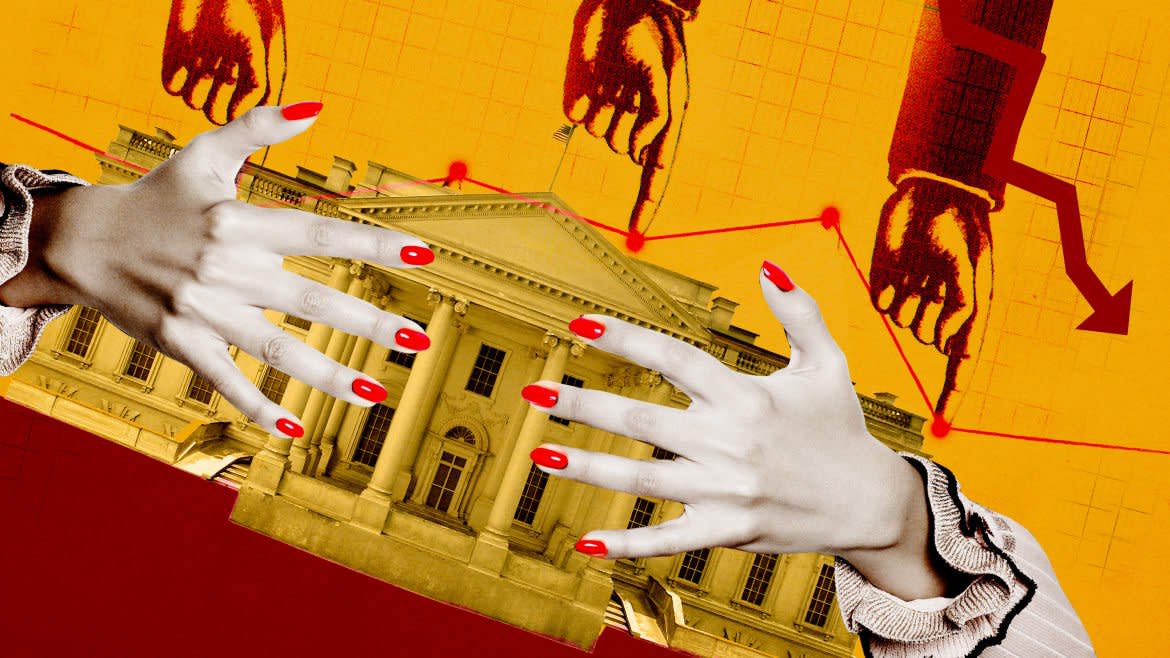Exclusive Poll Reveals Dems’ Sexism Problem in 2020

Sexism is weighing down the women running for the Democratic presidential nomination, a new public opinion survey conducted by Ipsos for The Daily Beast reveals.
A full 20 percent of Democratic and independent men who responded to the survey said they agreed with the sentiment that women are “less effective in politics than men.” And while 74 percent of respondents claimed they were personally comfortable with a female president, only 33 percent believed their neighbors would be comfortable with a woman in the Oval Office.
That latter number, explained Mallory Newall, research director at Ipsos, was a strong tell about how gender dynamics were souring voters on certain candidates. Asking respondents how they believe their neighbors feel about an issue is “a classic method to get around people being reluctant to admit to less popular views.”
Other candidates have used this polling technique before. During his 2006 Senate run in Maryland, former RNC chair Michael Steele had his team ask voters if they felt comfortable electing a black man to the post and if they believed their neighbors did as well. While personal comfort measured in the low 70s, only 40 or so percent of voters said they believed their neighbors would be fine with it.
Steele lost his 2006 race. And he sees parallels between what happened to him then and what’s happening to some of the women running for the Democratic nomination now.
“People will lie to you when you ask them about gender and race,” said Steele. “They will not tell you what they really feel about those things.”
The discomfort that voters have with female candidates helps explain one of the persistent undercurrents of the current election. In various hypothetical general election matchups, the male Democratic candidates have consistently done better against President Trump than their female counterparts.
This was largely true in the Ipsos poll as well. Former Vice President Joe Biden bested Trump by a 46-35 percent margin in a hypothetical matchup, while Sen. Bernie Sanders (I-VT) beat Trump by a margin of 47-35 percent. By contrast, Sen. Elizabeth Warren (D-MA) beat Trump by a 42-36 percent margin and Sen. Kamala Harris (D-CA) beat him by a margin of 41-35 percent.
“I believe that it takes longer for voters to buy into a woman’s candidacy then it does a man’s,” said Jen Palmieri, who served as a senior adviser to Hillary Clinton’s 2016 campaign. “That’s one of the reasons you’ve seen men pop early. The women take longer to rise.”
But the gender-related hurdles may go deeper than that. The female candidates running for the Democratic nomination also face a steep hurdle in winning over voters due to fears that their gender will pose significant problems in a general election.
Warren’s Problem: Men Who Don’t Want to ‘Risk’ a Female President
Nearly two out of every five Democratic and independent voters (39 percent) said they believed a female candidate would have a harder time running against Trump than a male candidate would. A chunk of that sentiment appears to be drawn from lingering fear and stress from the 2016 election outcome. A full 76 percent of Democrats, and 53 percent of independents, said they believe gender and sexism played a role in Clinton's defeat.
The findings provide one of the clearest illustrations to date of the difficulties that Warren, Harris, Sen. Amy Klobuchar (D-MN), and others have faced in trying to break through a field led, so far, by white male candidates. At a time when the vast majority of Democratic primary voters say they value a candidate’s ability to beat Trump above all else—and 82 percent of respondents said this was an important attribute to them in the Ipsos poll—female candidates are having to deal with concerns that their sex makes them less electable.
“Talk about learning the wrong lessons,” said Palmieri. “We’ve had two elections since Trump has been either on the ballot or been in office. In one, a woman got 2 million more votes than he did, and in the midterms, women candidates won in historic numbers. So the only evidence that we have shows that having women on the ballot in the Trump era is a good thing.”
“I think Democrats have a lot of trauma about the 2016 outcome and are suspicious that voters have an unease with women candidates,” she added. “But the actual record shows a different story.”
Got a tip? Send it to The Daily Beast here
Get our top stories in your inbox every day. Sign up now!
Daily Beast Membership: Beast Inside goes deeper on the stories that matter to you. Learn more.

